The next in our series of chats with sustainability pioneers takes us to Akepa: a sustainability marketing agency with a base in sunny Barcelona, Spain.
We’re half joking. We didn’t actually sit down and talk to ourselves.
Not quite yet. What actually happened is that Yuliya Hancharova, a student at the University of Trento, got in touch with Akepa to talk to us about sustainable marketing for her Master in International Management thesis. And her questions were so thoughtful, we wondered: why not share our conversation on communications for sustainable brands?
So that’s exactly what we’re doing. Hopefully this’ll give those other folk curious about sustainability marketing some insights too – as well as those tempted to learn more about the arcane operations at Akepa.
Let’s get cracking…
How does Akepa approach client selection? Do you have an established criteria for client selection?
They should be a sustainable brand – or a brand making an authentic transition to more sustainable ways. We also shouldn’t see a history of harm. There are also some industries we won’t work with (e.g, fossil fuels, fast fashion). We evaluate on a case-by-case basis but typically the clients that get in touch are a good fit, and the dodgier companies are the exception. Size wise, the brands we work with can be startups or SMEs, but also major players changing to better ways.
Believe it or not, there are also quite a lot of scams around too – so we do get together and look into each client before responding to a brief. Just to be sure we’re not wasting our time.
Do you also work with “not yet” sustainable companies? Do you have clients that are not sustainable as a firm but have sustainable projects?
Yes, and ‘sustainability’ can have quite a wide definition. Perfection can’t happen overnight – there aren’t many (or even any) perfectly sustainable companies. It has to be a transition so we do work with companies making a genuine change, or with an impactful project.
I’d also point out that for Akepa ‘sustainability’ isn’t just about the environment, even though that’s the typical connection. So when we get contacted by a company that’s not obviously sustainable, we ask ourselves other questions. How are they making society better? Are they doing something that still helps people?
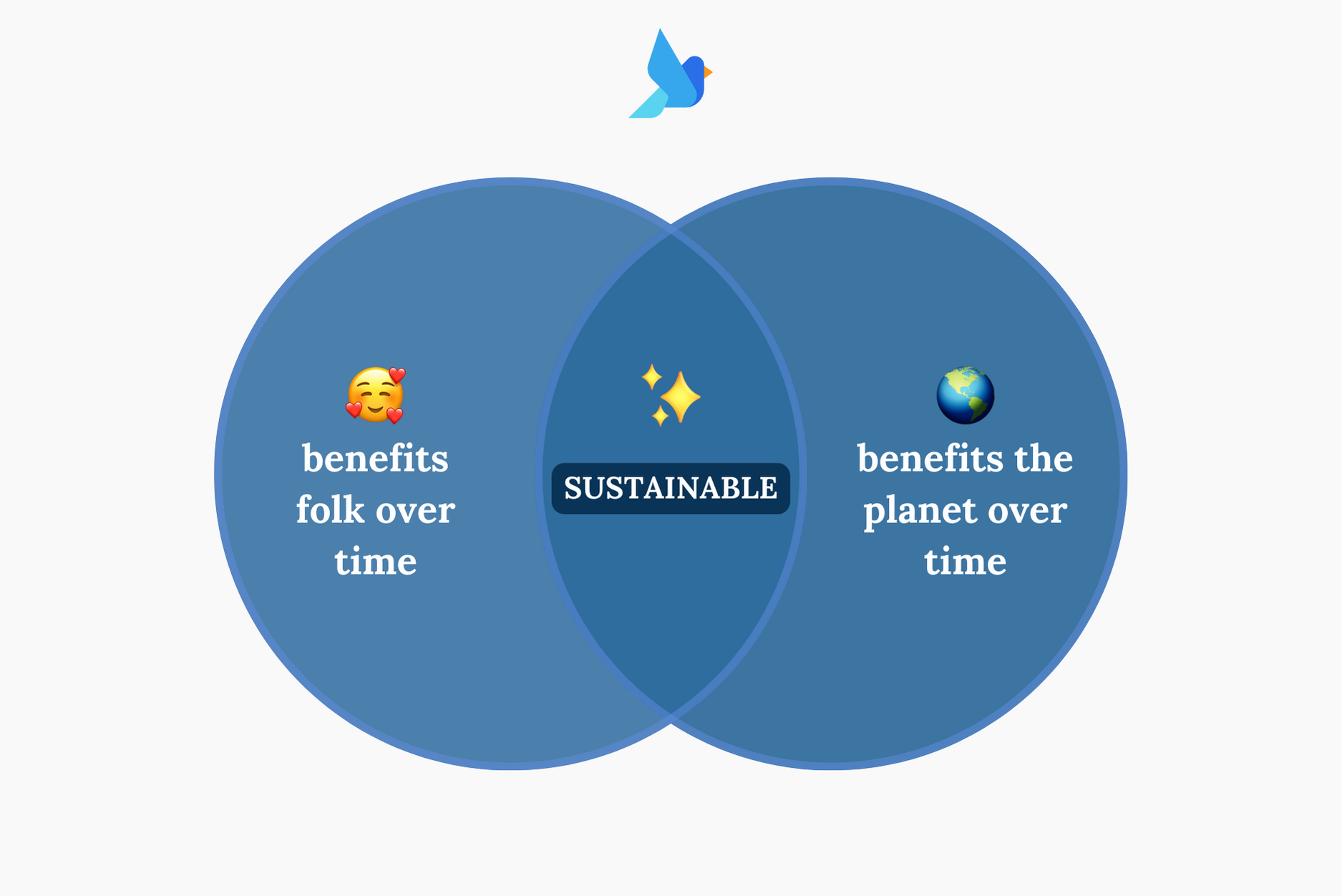
Is there a difference in the price you charge sustainable clients compared to “not yet sustainable” clients?
No, no difference. Although we may sometimes charge a smaller company a little less to begin with to help them get established if we are excited by their mission yet they have lower budgets. But apart from that our pricing is quite consistent.
Are there any particular challenges you have faced while working simultaneously with sustainable and “not yet sustainable” clients?
No, as before, there aren’t many perfectly sustainable clients and often there are contradictions with the ones you think are. So we just make sure we have a consistent argument for the clients that we work with, while avoiding greenwashing, and we don’t face ethical challenges with working with any clients – simultaneously or otherwise.
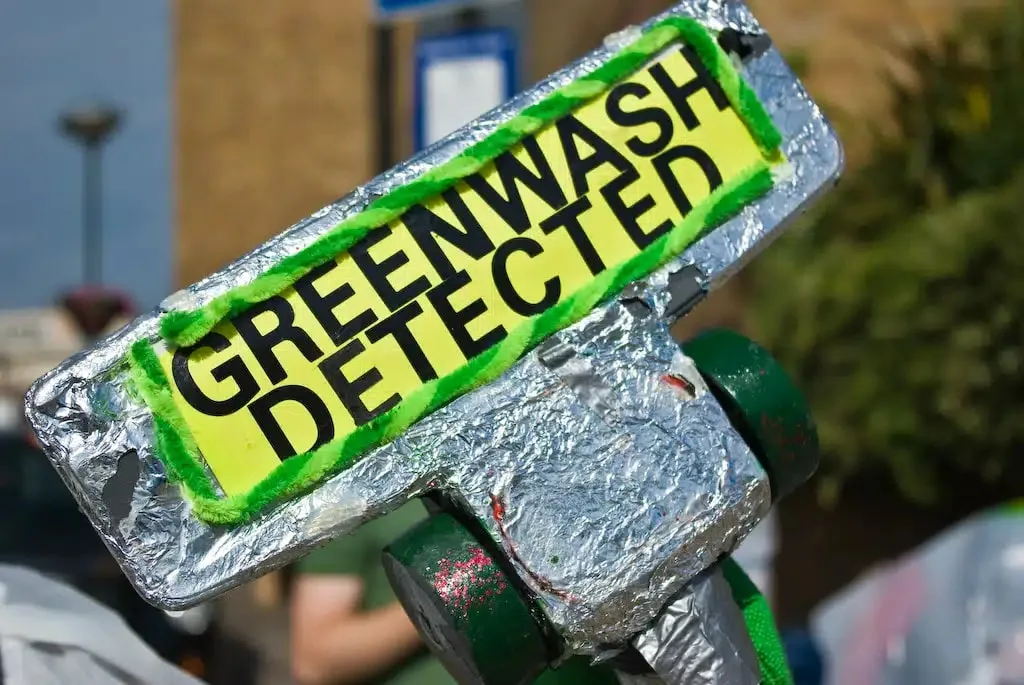
How does Akepa approach the challenge of maintaining ethical standards while ensuring profitability for both the agency and clients?
Demand for sustainability marketing is rising but still surprisingly low and quite a few of our clients are startups. At the moment the challenge isn’t so much profitability and balancing with ethical standards. We’re way before that point and more challenged by generating demand and making sure the business survives – in a time where sustainability investment is still flaky. Often the challenge is the same for clients – despite everyone’s best intentions.
How do you think international guidelines on sustainability apply to your business? Do you report on Akepa’s sustainability progress and, if so, do you follow international guidelines like the Global Reporting Initiative?
At the moment, we don’t create a regular sustainability report involving international guidelines or otherwise but this is something we’re aiming to do at the end of the year. We’ll also aim to make it as visual as possible and not too dry to better convey the story of the year. Meanwhile, transparency is important to us though and you can track the progress relating to our work with ClimatePartner online. We also keep our website’s sustainability page up to date with anything new we’re doing – e.g. our recent rewilding partnership with Mossy Earth.
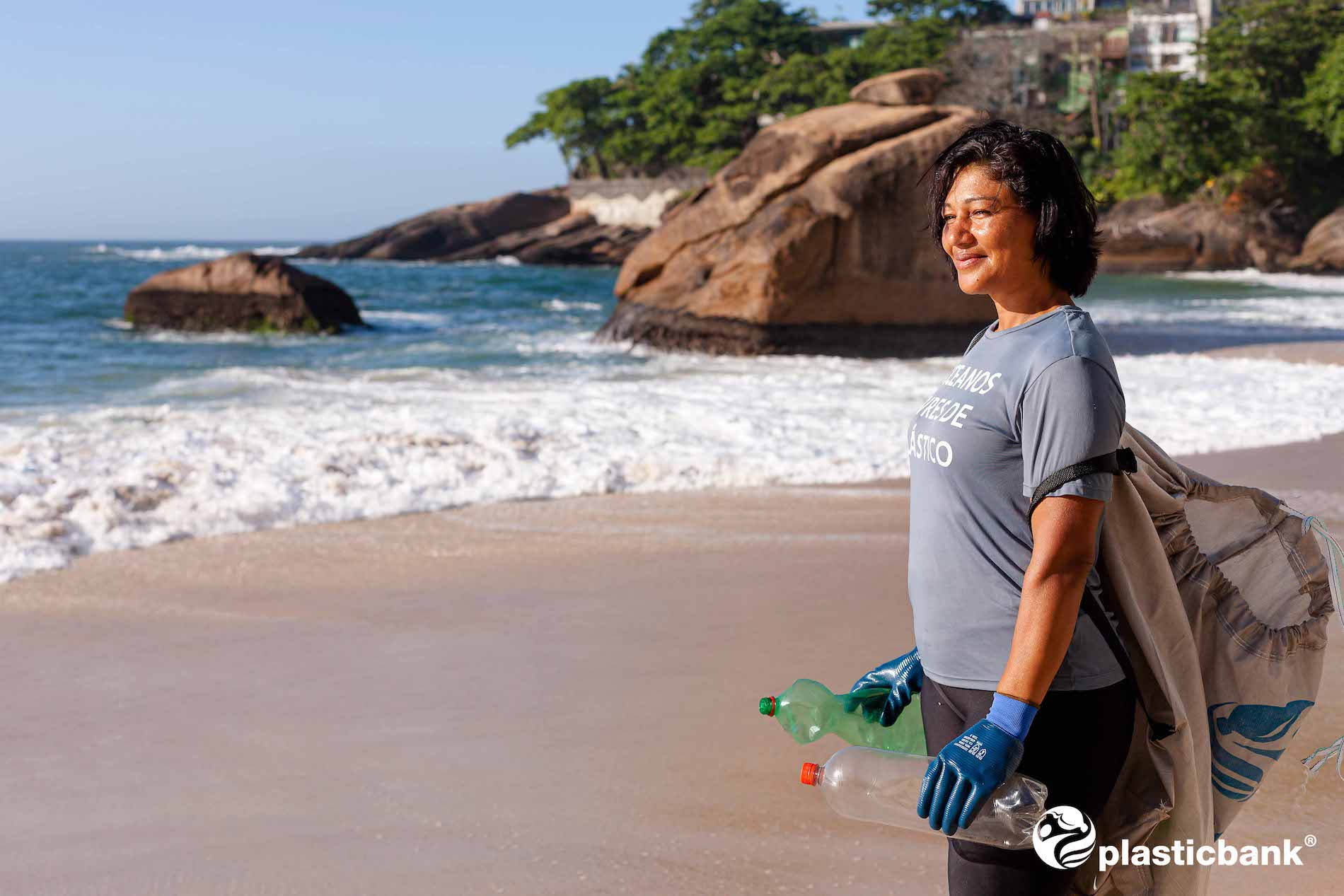
What is your opinion about third parties that measure sustainability progress? I saw that Akepa collaborates with ClimatePartner and Mossy Earth but are you considering other routes? For example, is Akepa a B-corp? If not, do you consider applying?
We are always considering ways to become more sustainable, including a balanced set of certifications to add validity. But for a marketing agency it’s not all about that. It’s also about clients. We are ClimatePartner certified, which is a leading certification relating to climate impact and emissions. But we don’t just aim for one big flagship like B Corp and leave it there. We try to keep our emissions low (e.g. 100% remote operations), work with partner companies that can lift our own sustainability and we also choose who we work with carefully, to avoid any contradictions. Our partnership with Mossy Earth, for example, allows us to support vetted rewilding projects in different parts of the globe. We’re all nature lovers, so it’s a fitting enhancement to the work we do.
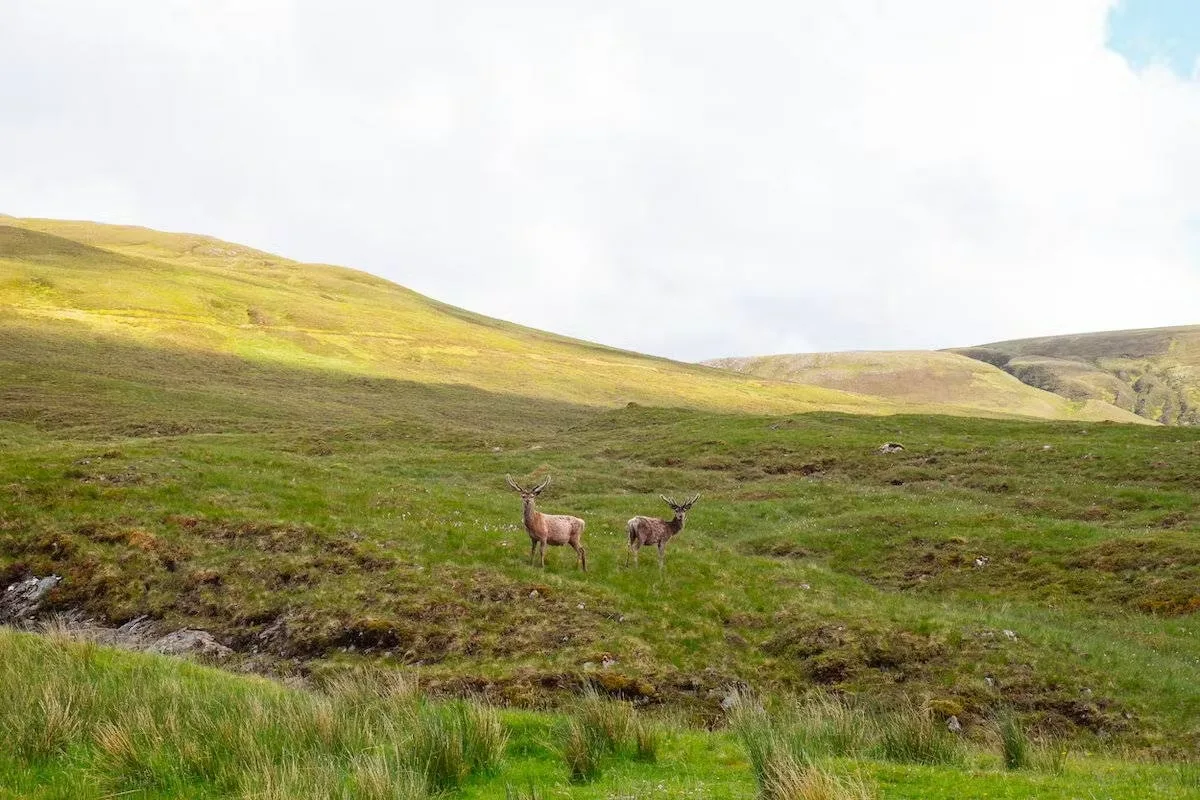
About being a B Corp. We’ve been a bit amazed by some of the companies being B Corped, so we’ve decided not to get involved for now. In the agency world, some B Corp agencies work with fossil fuel clients, for example, and this can be frustrating to see. That, and the process can be quite long and expensive, more feasible for larger companies. Still, never say never! And despite the imperfections it’s obviously a certification worth mulling over – at least because of how convincing it is for clients.
Do you find certifications useful in assessing clients’ authenticity towards sustainability?
Yes, despite our reservations about certain certifications, it is still true that they do add necessary validity to sustainability – especially with so much greenwashing about. But it’s also useful to know the certifications that are more valid than others. For instance, if we see a sustainable fashion client using GOTS certified organic cotton, then that’s a reassuring sign for us because that certification is a global leader in the textile industry. On the other hand, there are other textile certifications that are a bit more dubious. We’re also able to look beyond certifications when assessing sustainability too because it’s a complex area, especially for young companies to navigate – but the leading certifications certainly do help find some focus.
In the client search, is there an industry where finding sustainable clients is more straightforward? Do you work within each industry, or are they selected?
There are certain industries we won’t work with – I mentioned a bit about this before – but apart from that we are open to working with clients from any valid industry that can be improved with a boost to sustainability, although it does help when you’ve already worked with a client in a given sector to do more convincing work on the project. At the moment, I’d say that the most leads we get are from sustainable fashion, and apart from that there’s a wide and often unexpected mix – not just in terms of industry but also where the client is based. I think the last few reliable leads we’ve had have been from Australia, the UK, Italy, Germany, and Los Angeles, and all from totally different industries.
Do you believe that sustainable marketing agencies bear the responsibility of educating clients about sustainability? Is the role limited to helping clients communicate sustainability to customers, or does it go beyond?
I wouldn’t say it’s so much about education, or teaching, or even knowing the most about the industry – which is often the client’s area anyway. It’s more about knowing how to convey the message in a way that has an impact, often driven by data and in collaboration with the client’s deeper expertise. Our goal as an agency is to help the client succeed. To do that, it’s also about not making sustainability boring, depressing, drowning in details, or sanctimonious etc. It’s also about not overdoing sustainability – any client has to also talk about their core focus / product, too, sometimes even more so than talking about sustainability matters. Otherwise, folk will switch off quickly.
Hypothetically, if all marketing agencies adopt sustainability criteria in client selection, they could influence which companies succeed. While it is an idealistic scenario, do you believe sustainable marketing agencies have such influence?
I don’t believe sustainable marketing agencies yet have the power to significantly transform the market – as there are more powerful influences at play. What’s clear though is that many big agencies or companies are claiming that they’re sustainable, or something synonymous, but often spuriously to say the least. So what is happening is that the sustainable marketing agency landscape itself is becoming more blurry, indefinable – and questionable. It’s getting hard to say where the true players are. This also affects the influence that sustainable marketing agencies (also companies) can have. After all, how can sustainable marketing agencies reshape the market if those so-called agencies, and their clients, are not actually sustainable? It starts to get a bit Kafkaesque.
Is Akepa focused on building a movement for change towards sustainability? If so, do you collaborate with other sustainable marketing agencies? Could you say that purpose-driven firms are more collaborative than competitive?
We do try to collaborate as much as we can but, paradoxically, there doesn’t seem to be as much collaboration within the sustainability community as there should be. It can be a little… internecine where there should be more getting together. The idea should be to gain more work for everyone involved, at the expense of those other agencies or companies who’re not so sustainable or eco-friendly but this isn’t quite happening. Perhaps because people feel ‘sustainability’ very personally and are less likely to share it. That’s a loose hypothesis but it’s a big challenge and something we’ll probably write about on our blog or social media soon.
Curious to learn more about Akepa’s services? Well you’re on the website now but you can also write to us directly.
And if you’re interested in what Yuliya was studying to end-up chatting to Akepa about sustainability marketing then here’s the link to her Master’s in International Management program.

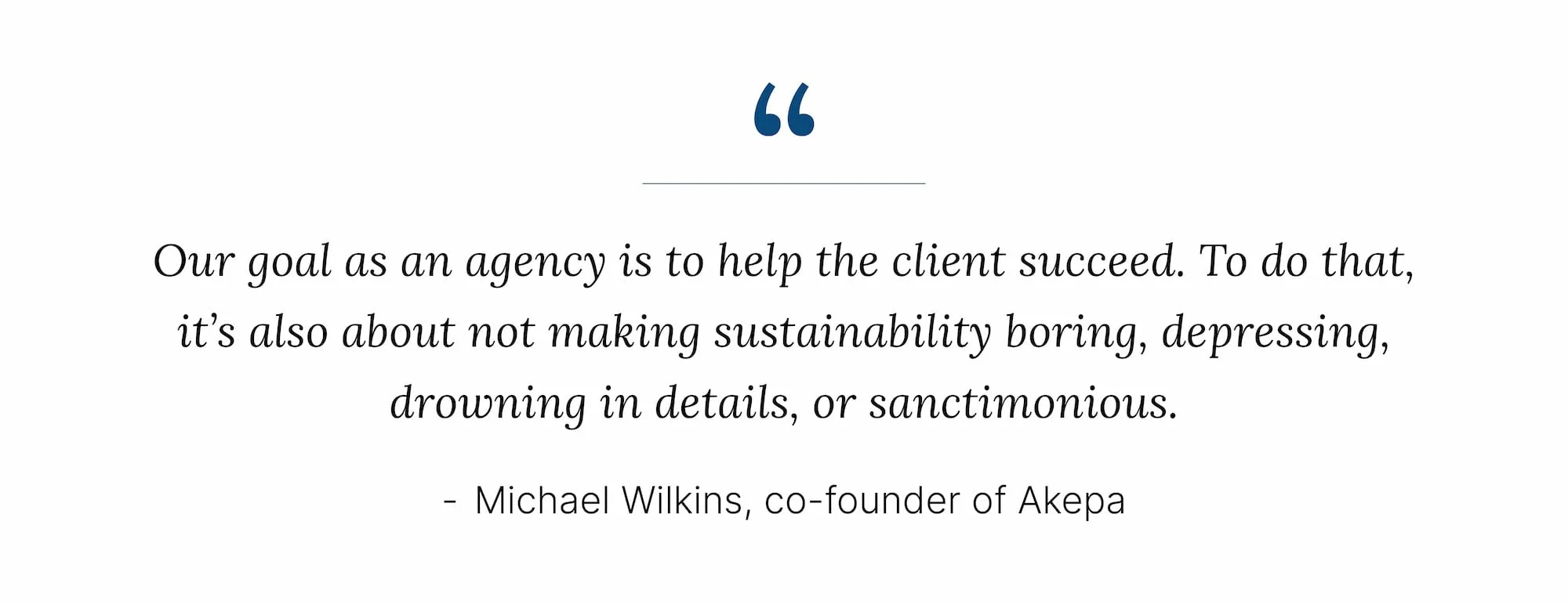


It’s a brave entity I think as it interacts with corporate, but says “No to greenwashing!” Kudos.